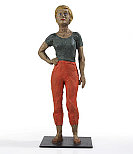
Aristide Maillol
Banyuls-sur-Mer
1861 -
Banyuls-sur-Mer
1944
Aristide Maillol studied at the École des Beaux-Arts in Paris and at the Académie under Alexandre Cabanel and Jean Léon Gérôme from 1882 to 1886. His contemporaries Pierre Puvis de Chavannes and Paul Gauguin influenced the artist. In 1893 Gauguin suggested him to join the artist group "Nabis". Around the turn of the century the Nabis developed an anti-naturalist, symbolist pictorial language with two-dimensionally-decorative, simplified colour shapes and black contours. This style influenced his early paintings and tapestry designs.
In 1897 he set up a small tapestry studio at his home village of Banyuls, where he employed local women for weavings. Up to 1900 he produced wall tapestries in the Art Nouveau style, but then an eye disease forced him to concentrate autodidactically on sculpture - small statues made of wood and clay from which he developed his monumental stone and bronze statues. The main subject of his sculptural work was the female nude, which featured a classic calmness and a clear, closed plasticity.
His first main work "La Méditerranée", made between 1902 and 1905, reveals an approach to classical, statuary forms and his striving for a closed sculptural volume, a harmonious balance and a calm classical expression, which was adopted from Hellenistic Antiquity. Aristide Maillol's compact, voluptuous female figures, reminiscent of Gauguin's women as well as of Renoir's later nudes, considerably influenced European and particularly German sculpture.
Maillol also produced important graphic works - drawings, lithographs and particularly series of woodcuts, which the enthusiast for Antiquity made to illustrate antique literature. A first overview of his creations was shown in Paris in 1937: As part of the exhibition "Les maîtres de l'art indépendant", which was shown at the Petit Palais parallel to the World Exhibition, three rooms were reserved for Maillol.
The artist was awarded with large orders, e.g. in 1936 the order for the monumental sculpture "La Montagne" for the planned Museum of Modern Art in Paris. In 1944 Aristide Maillol died from the consequences of a car accident.
Often Maillol is called the "Cézanne of sculpture", as he - like Cézanne - smoothed the way to abstraction.
Would you like to sell a work by Aristide Maillol?
Infos for seller






